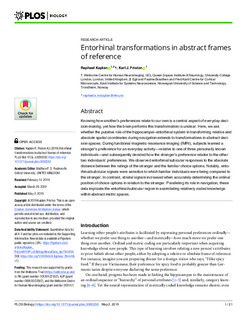| dc.contributor.author | Kaplan, Raphael | |
| dc.contributor.author | Friston, Karl | |
| dc.date.accessioned | 2019-05-13T08:53:33Z | |
| dc.date.available | 2019-05-13T08:53:33Z | |
| dc.date.created | 2019-05-08T13:33:35Z | |
| dc.date.issued | 2019 | |
| dc.identifier.issn | 1544-9173 | |
| dc.identifier.uri | http://hdl.handle.net/11250/2597356 | |
| dc.description.abstract | Knowing how another’s preferences relate to our own is a central aspect of everyday decision-making, yet how the brain performs this transformation is unclear. Here, we ask whether the putative role of the hippocampal–entorhinal system in transforming relative and absolute spatial coordinates during navigation extends to transformations in abstract decision spaces. During functional magnetic resonance imaging (fMRI), subjects learned a stranger’s preference for an everyday activity—relative to one of three personally known individuals—and subsequently decided how the stranger's preference relates to the other two individuals’ preferences. We observed entorhinal/subicular responses to the absolute distance between the ratings of the stranger and the familiar choice options. Notably, entorhinal/subicular signals were sensitive to which familiar individuals were being compared to the stranger. In contrast, striatal signals increased when accurately determining the ordinal position of choice options in relation to the stranger. Paralleling its role in navigation, these data implicate the entorhinal/subicular region in assimilating relatively coded knowledge within abstract metric spaces. | nb_NO |
| dc.language.iso | eng | nb_NO |
| dc.publisher | PLOS, Public Library of Science | nb_NO |
| dc.rights | Navngivelse 4.0 Internasjonal | * |
| dc.rights.uri | http://creativecommons.org/licenses/by/4.0/deed.no | * |
| dc.title | Entorhinal transformations in abstract frames of reference | nb_NO |
| dc.type | Journal article | nb_NO |
| dc.type | Peer reviewed | nb_NO |
| dc.description.version | publishedVersion | nb_NO |
| dc.source.volume | 17 | nb_NO |
| dc.source.journal | PLoS biology | nb_NO |
| dc.source.issue | 5 | nb_NO |
| dc.identifier.doi | https://doi.org/10.1371/journal.pbio.3000230 | |
| dc.identifier.cristin | 1696384 | |
| dc.description.localcode | Copyright: © 2019 Kaplan, Friston. This is an open access article distributed under the terms of the Creative Commons Attribution License, which permits unrestricted use, distribution, and reproduction in any medium, provided the original author and source are credited. | nb_NO |
| cristin.unitcode | 194,65,60,0 | |
| cristin.unitname | Kavliinstitutt for nevrovitenskap | |
| cristin.ispublished | true | |
| cristin.fulltext | original | |
| cristin.qualitycode | 2 | |

